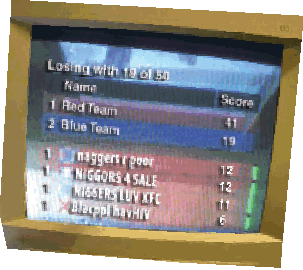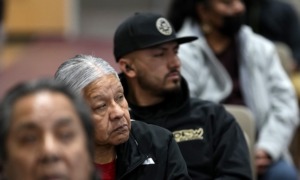 |
|
These screen names from XBox Live reveal one way players express racism. |
So you think you’re providing constructive activities for kids by enabling them to plug into one of the more popular pastimes of the day: playing live Internet games against people from all over the country or even the world. But if you listen in on the games, it might not be long until you hear this:
“You’re dead, f***ing ni**er!”
That comment, from an anonymous teenage player, was directed at Joseph Moreno, a 28-year-old law school student, through Xbox Live – and it’s not unusual, according to youth and adult gamers. At a time when a black man stands a reasonable chance of becoming president in no small part due to young voters, and racially charged epithets have become ever more rare in public, online gaming offers a different social indicator: Many youths are spending large chunks of their time in a virtual world as purveyors and victims of racist commentary.
Youth programs that are using this and other such gaming technology should at least be aware of the situation, and the methods available to hinder it.
After all, a 2008 study by Internet Solutions for Kids found that, of youth who are harassed online, 30 percent say it happens while playing games. (For more on the study, see Research of Note, page 30.)
We first heard about the phenomenon through Isaiah Lollis, whose mother works for Youth Today’s parent organization, the American Youth Work Center. Isaiah, 16, got XBox Live for Christmas, and his first log-on was to play the popular war game, “Halo.”
A half-hour later, Isaiah was done.
“I used the screen name Ruthless Zaya, and they must have thought it was like a black name,” Isaiah says. “They started callin’ me the n-word. And they kept callin’ me that and callin’ me that. And I got really mad.”
How Does it Happen?
XBox Live was widely hailed as one of the greatest technological developments in gaming history when Microsoft introduced it to the XBox system five years ago. Players can log on to XBox, slide in a game and play against or alongside others through the Web. Players use a headset and microphone to communicate with opponents and allies in real time and without filtering by a human monitor. (Internet chat rooms, on the other hand, feature time delays and sometimes monitors.)
While XBox Live wasn’t the first endeavor of its kind, it was the first to be widely and commercially available, says William Bell, who writes a video game blog called “The Will Effect.”
“It’s technologically pretty amazing,” Bell says. “It’s a global network: You can play with people all over the world 24 hours a day.” More than 10 million people are members of XBox Live, according to Microsoft.
XBox Live has expanded the ways people can game competitively: The best players from anywhere can match up without leaving home. It also provides an entertaining means of communication among families and friends.
And it enables gamers to utter racial slurs with few consequences, like these that Moreno says were directed at him:
“That ni**er must still be in here, it smells like s**t.”
“I love it when ni**ers play. I love killing them.”
What makes gamers assume that a foe is black? Their screen names, their profile icons and sometimes their voices. Moreno is Caucasian and Mexican, but his XBox screen name is Joeblackisback.
Bell, who is black, recently jumped into a war game named “Call of Duty 4,” where three gamers were playing. He says that “anybody who didn’t sound like them” – the other players had Southern accents – “they were yelling out racial slurs. Ni**er this, ni**er that. It was persistent.”
“It sort of developed over time,” Bell says of the racism he says has become rampant on XBox Live. He and Moreno say most of the racial venom comes from players who sound like youths.
Blocking Moves
There are several ways to shield against the assaults.
XBox provides a mechanism for reporting users who behave inappropriately. Microsoft policy says that after 10 reports about one gamer, the company might ban that player or turn off the player’s ability to speak online.
Microsoft offers parental control settings that allow parents to control their kids’ online experience, with options for setting how long their children can use their XBox 360s each day, what types of games they can play and who they can play with (such as, “friends only”).
“Microsoft does not tolerate racial or other inappropriate behavior on Xbox Live,” says Aaron Greenberg, group program manager for Xbox Live. In October, he says, complaints were logged from less than 1 percent of that month’s users.
That could indicate that people don’t know about the complaint process or are not motivated to use it. In discussing XBox racism, several bloggers have said Microsoft doesn’t respond strongly enough.
Isaiah didn’t need the parental controls. He says he now plays only against his friends from school, excluding himself from the larger online community.
Anthony Glynn contributed to this report.
Associate Editor John Kelly can be reached at jkelly@youthtoday.org.






























